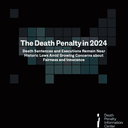
The nation’s death rows are shrinking more rapidly than new defendants are being sentenced to death, according to a new Bureau of Justice Statistics (BJS) statistical brief, “Capital Punishment, 2014 – 2015.” The statistical brief, which analyzes information on those under sentence of death in the United States as of December 31, 2014 and December 31, 2015, documents a continuing decline in executions, new death sentences, and death row populations across the U.S. 2015 marked the fifteenth consecutive annual decrease in the number of prisoners under sentence of death in the U.S. According to BJS, 69 prisoners were admitted to state or federal death rows in 2014 and 49 were admitted in 2015. (DPIC uses a slightly different counting method that reported 73 death sentences imposed in 2014.) The data also indicates that the decline in the size of death row is attributable to factors other than execution. According to BJS, 75 prisoners were removed from death row in 2014 by means other than execution, such as exoneration, the reversal of a conviction or death sentence, commutation, or death by other causes, as compared with 35 who were executed. In 2015, 82 prisoners were taken off death row by means other than execution, while 28 death-row prisoners were executed. Over the two-year period covered by the data, 39 more prisoners were removed from death row by means other than execution than were admitted as a result of new death sentences. The gap between removals from death row and new admissions is expected to widen even further in 2016 and 2017 as a result of record-low death-sentencing rates and prisoners being removed from death row due to death-penalty statutes having been declared unconstitutional in Florida, Delaware, and Connecticut. BJS reports that 2,881 prisoners remained under sentence of death in 33 states and the federal system at the end of 2015. (Click image to enlarge.)
(T. Snell, “Statistical Brief: Capital Punishment, 2014 – 2015,” Bureau of Justice Statistics, May 2017.) See Studies. Read DPIC’s Year End Reports for 2014 and 2015.



